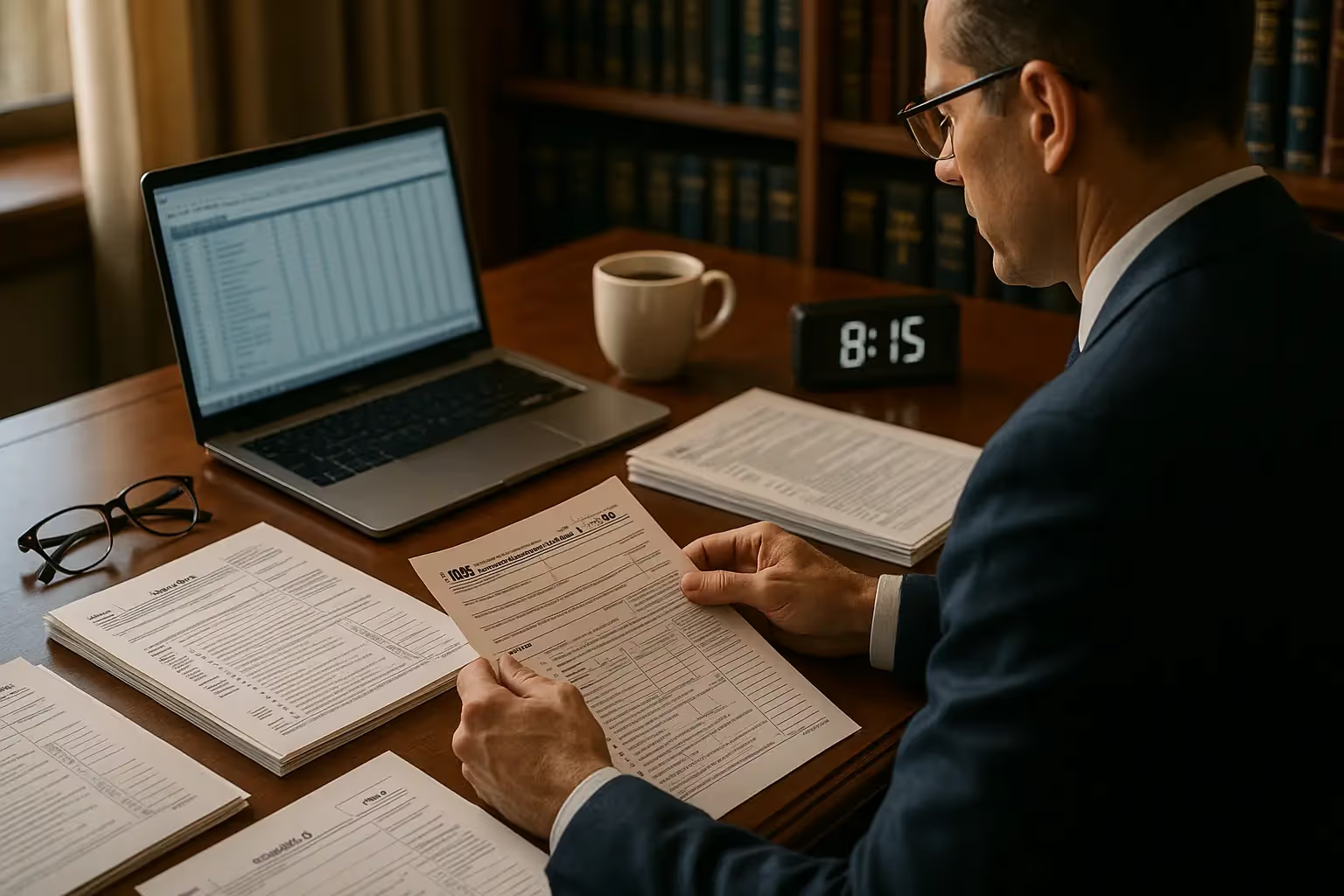
Form 945 is the annual return for reporting withheld federal income tax on nonpayroll payments. An unfiled 2011 Form 945 exposes businesses to significant IRS issues. These issues include penalties, interest, and potential trust fund recovery assessments. Ignoring this obligation can quickly escalate financial and compliance risks.
Even if a 2011 return remains unfiled, compliance is still possible through IRS procedures. Taxpayers can file Form 945 late with proper documentation. The IRS offers payment plans, penalty abatements, and settlement options for federal tax obligations. These programs exist to encourage voluntary compliance and financial resolution.
This guide explains each step required to resolve an unfiled 2011 Form 945. It walks readers through determining obligations and gathering records. It also covers penalties, resolution strategies, and when to seek professional support. Readers will gain actionable strategies for compliance and IRS issue resolution.
Understanding Form 945 and Federal Income Tax Obligations
Form 945 is the annual return used to report withheld federal income tax on nonpayroll payments under employment tax laws. It serves a different purpose than payroll employment taxes reported on Forms W-2 or Form 941, making it essential for accurate compliance. When a taxpayer submits this form correctly, it ensures proper reporting of withholding taxes, nonemployee compensation, and other payments received during the tax year. Failure to file Form 945 for prior years, such as the unfiled 2011 Form 945, can create penalties and IRS notices.
Scope of Form 945 Reporting
- Withheld federal income tax: Employers must report income tax withholding from pensions, annuities, gambling winnings, and independent contractor payments.
- Backup withholding: Employers report certain withholding taxes required when recipients fail to provide taxpayer identification numbers or provide false information.
- Annual return requirement: Taxpayers must file Form 945 each calendar year if they have income tax withholding obligations.
- Distinction from payroll filings: Employment tax returns such as Form W-2, Form W-3, and Form 941 address wages, social security, and employee payroll.
Legal Framework and Compliance Requirements
- Internal Revenue Code: The law defines withholding responsibilities and applicable penalties for non-filed forms, inaccurate information, or willful neglect.
- Revenue Act history: The Revenue Act established the foundation for employment tax laws and continuing reporting obligations for federal tax compliance.
- Due date and timely filing: The IRS requires Form 945 to be filed by January 31 of the following year.
- Civil penalties: Failure to file or deposit can lead to civil penalties, deposit penalties, or other applicable penalties.
Common Issues and Risks for Taxpayers
- Unpaid taxes: When an employer fails to file information returns, the IRS may assess employment tax liability and related penalties.
- Nonemployee compensation: Independent contractor payments require correct reporting to avoid inaccurate or false information on information returns.
- Reasonable cause exceptions: The IRS may accept a reasonable cause explanation to abate penalties for failure if justified.
- Willful neglect consequences: Cases of willful neglect can trigger severe civil penalties for taxpayers under applicable employment tax laws.
Filing Methods and Practical Considerations
- File electronically: The IRS allows taxpayers to file electronically to improve accuracy and timely filing compliance.
- File Form 945 by mail: If electronic filing is not used, taxpayers may still file paper copies of forms.
- Corrected wage reporting: If errors affect employment tax liability, employers must issue corrected wage and tax statements or Forms W-2.
- Professional assistance: Many taxpayers rely on a tax professional to handle filing, address prior years, and manage IRS correspondence.
Consequences of Noncompliance
- Failure to file: Non-filed forms for prior years create significant employment tax liability and subject taxpayers to applicable penalties.
- Failure to deposit: Deposit penalties apply when employers delay payments or withhold federal income tax deposits.
- IRS enforcement: The IRS issues a notice if a taxpayer fails to file information returns or fails to make payments.
- Civil penalties: Applicable penalties may include fines for inaccurate information or filing late tax returns.
In summary, Form 945 ensures compliance with employment tax laws and federal income tax withholding obligations. Taxpayers who file Form 945 correctly avoid unpaid taxes, penalties, and IRS enforcement actions. Those with an unfiled 2011 Form 945 or other prior years can still resolve issues by filing and making payments. Taking timely action, supported by a tax professional, reduces risks and ensures compliance with the law.
Determining Your Filing Obligation for the 2011 Annual Return
Before filing, it is important to understand when you must file Form 945 for 2011 and when it is not required. The IRS provides clear rules on filing obligations for withheld federal income tax, backup withholding, and voluntary withholding arrangements. Knowing these rules helps taxpayers avoid unnecessary penalties and ensures compliance with IRS requirements.
- Situations requiring filing: You must file Form 945 for the 2011 tax year if you withheld federal income tax on pensions, annuities, gambling winnings, or other nonpayroll payments.
- Backup withholding obligations: You must file if you collected backup withholding on payments where taxpayers provided false or missing taxpayer identification numbers.
- Voluntary withholding arrangements: Filing is necessary if you agree to withhold certain taxes for recipients of government payments or non-employee compensation.
- When filing is not required: You are not required to file if you had no employment tax liability and withheld no federal income tax during 2011.
- Confirming obligations through IRS records: You can confirm whether filing is required by requesting IRS transcripts showing information returns and withholding reported under your taxpayer identification number.
- IRS notices and correspondence: Review any IRS notices received. These may indicate unfiled forms or tax liability linked to prior years.
Understanding these rules ensures you know whether filing Form 945 is required for the 2011 annual return. By confirming your obligations early, you avoid unnecessary penalties and take the correct steps toward compliance.
Preparing to File Your 2011 Form 945 and Employment Tax Records
Before you file your unfiled 2011 Form 945, you must prepare by collecting the correct records and resources. Proper preparation ensures that your federal tax and withholding obligations are accurately reported and reduces the risk of penalties.
- Gather essential information returns: Collect Forms 1099, Forms W-2, and Forms W-2G, which document income tax withholding and payments received during the tax year.
- Collect deposit records: Retrieve bank deposit slips, payment confirmations, and IRS correspondence showing deposits made or unpaid taxes related to the 2011 annual return.
- Access prior-year forms: Visit the IRS website to download the 2011 Form 945 and instructions from the prior-year forms section for accurate filing.
- Review IRS correspondence: Examine any notices or letters issued by the IRS that reference your employment tax liability or past filing obligations.
- Seek professional guidance: Engage a tax professional who understands employment tax laws to verify information and ensure compliance with the Internal Revenue Code.
Taking these steps allows you to file Form 945 with confidence and ensures you properly address your 2011 employment tax liability. By preparing thoroughly, you reduce the risk of errors, applicable penalties, and IRS disputes when filing.
Step-by-Step Filing Process for the Unfiled 2011 Form 945
Filing an unfiled 2011 Form 945 requires careful attention to detail so that the IRS accepts the tax return without issue. Each step ensures accurate reporting of federal income tax withholding, proper calculation of employment tax liability, and compliance with annual return requirements.
Enter Withheld Federal Income Tax and Deposits
- Report withheld federal income tax: Enter the total withheld federal income tax from pensions, annuities, gambling winnings, and other covered payments.
- Include backup withholding: Add any backup withholding collected from recipients who provided false or missing taxpayer identification numbers.
- List federal deposits: Record all withholding tax deposits made during the 2011 tax year.
Calculate Balances and Employment Tax Liability
- Determine total tax: Add withheld federal income tax and backup withholding to calculate the total tax liability.
- Compare with deposits: Subtract total deposits from the total tax to identify a balance due or an overpayment.
- Identify overpayments: Apply any overpayments to the following year or request a refund through the IRS.
Complete the Monthly Summary if Required
- Summarize monthly liability: If the total tax exceeds $2,500 for the tax year, enter the tax liability for each month.
- Use Form 945-A if needed: Complete Form 945-A for an annual record of federal tax liability when required by IRS rules.
- Ensure accurate reporting: Verify figures to match the annual return totals and IRS deposit requirements.
Submit the Return to the IRS
- Mail to the correct address: Send the completed form to the IRS processing center specified in the 2011 instructions.
- Include payment voucher: Attach Form 945-V with any balance due to avoid a deposit penalty or delay in processing.
- File electronically if possible: Consider electronic filing to reduce errors and confirm timely filing with an electronic acknowledgment.
Avoid Common Mistakes When You File Form 945
- Check for mismatched figures: Ensure that the total deposits match the reported withholding and that the lines are reconciled across the return.
- Review skipped sections: Complete every required part of the annual return to avoid IRS notices for missing information.
- Verify information returns: Confirm consistency between Form 945, information returns such as Forms 1099, and wage and tax statements.
- Correct errors quickly: File corrected forms or explanations if inaccurate information is discovered after submission.
Following these steps allows taxpayers to file Form 945 for prior years, like 2011, with greater accuracy and confidence. Proper preparation and timely filing reduce applicable penalties and demonstrate good faith to the IRS.
IRS Penalties and Interest for Failure to File and Deposit Penalties
The IRS imposes a failure-to-file penalty when an employer fails to submit Form 945 on time. This penalty is five percent per month, up to twenty-five percent of the unpaid federal tax. The penalty continues until the taxpayer submits the required annual return. Employers often underestimate how quickly these penalties accumulate over prior years.
Deposit penalties apply when employers fail to make required payments or deposits of withheld federal income tax. The IRS charges between two and fifteen percent, depending on how late deposits are made. These penalties significantly increase overall employment tax liability for affected taxpayers. Even small delays in making payments can create a lasting financial burden.
Interest compounds daily on unpaid taxes, penalties, and interest until the full balance is paid. For a 2011 annual return filed in 2025, combined charges may exceed the original withheld federal income tax. The IRS enforces these penalties under employment tax laws and the Internal Revenue Code. Taxpayers should act quickly to minimize civil penalties and interest charges.
Trust Fund Recovery Penalty and Employment Tax Liability Risks
The Trust Fund Recovery Penalty is one of the IRS's most serious enforcement tools for employment tax issues. It applies when an employer collects federal income tax or other withholding taxes but fails to remit them. Understanding how this penalty works helps taxpayers recognize the risks tied to employment tax liability and noncompliance.
- Application of the penalty: The Trust Fund Recovery Penalty applies when withheld federal tax from wages or other payments is not remitted.
- Personal responsibility: The IRS may assess this penalty personally against owners, officers, or financial controllers who manage employment tax returns.
- Willfulness standard: The IRS considers it willful neglect when an employer knowingly pays other creditors before paying federal income tax.
- Serious compliance risks: This penalty underscores why employment tax liability is one of taxpayers' most critical compliance issues.
By understanding how the Trust Fund Recovery Penalty works, taxpayers can take steps to avoid unpaid taxes and applicable penalties. Fairly compliance with employment tax laws and timely filing of annual returns protects businesses and responsible individuals.
Resolution Options for 2011 Form 945 Federal Tax Issues
The IRS offers several resolution paths for taxpayers who face overdue liabilities from an unfiled 2011 Form 945. These options address unpaid federal tax, penalties, and interest while helping taxpayers regain compliance with employment tax laws. Choosing the right program depends on each taxpayer’s financial condition, prior compliance history, and ability to make payments.
Payment Plans for Overdue Employment Taxes
- Short-term payment plan: Taxpayers can pay balances under $100,000 within 120 days without setup fees or additional agreements.
- Long-term installment agreement: Taxpayers with larger debts can pay monthly over several years, subject to setup fees and interest.
- Partial payment installment agreement: The IRS may approve reduced monthly payments if taxpayers cannot fully satisfy their tax liability.
- Benefit of payment plans: These programs prevent aggressive IRS collection actions while allowing taxpayers to make payments gradually.
Penalty Abatement Options
- Reasonable cause relief: The IRS may remove penalties if a taxpayer reasonably explains failure to file or deposit.
- First-time penalty abate: Taxpayers with a clean compliance history may qualify for one-time relief from applicable penalties.
- Statutory exceptions: Penalties may be waived if failure occurred because of IRS errors, incorrect advice, or disaster-related disruptions.
- Value of abatement: Penalty relief reduces overall federal tax liability and can make repayment plans more manageable.
Offer in Compromise Programs
- Doubt about liability: Taxpayers can settle debts if they show the original tax liability was assessed incorrectly.
- Doubt about collectibility: The IRS accepts less than the full amount if taxpayers prove they cannot pay in full.
- Effective tax administration: Taxpayers may qualify if paying in full would cause economic hardship despite accurate liability.
- Offer in Compromise outcome: Successful offers allow taxpayers to clear debts while paying less than the original balance due.
Currently Not Collectible Status
- Financial hardship qualification: Taxpayers may request this status if paying taxes would prevent them from meeting basic living expenses.
- Temporary suspension: The IRS halts active collection efforts but continues to add interest and penalties to unpaid balances.
- Ongoing review: The IRS periodically re-evaluates the taxpayer’s financial condition to determine if collection can resume.
- Benefit of CNC status: It provides breathing room for taxpayers experiencing serious financial hardship without immediate levy risk.
Taxpayers with an unfiled 2011 Form 945 must carefully evaluate these resolution options before acting. Choosing the right solution can reduce penalties, manage employment tax liability, and prevent long-term IRS enforcement actions. Seeking advice from a tax professional often helps taxpayers select the best strategy and prepare accurate documentation.
FAQs
Can I still file Form 945 for 2011 in 2025?
Yes, you can still file Form 945 for 2011 even in 2025. The IRS does not impose a statute of limitations on unfiled returns, so the obligation remains open until the taxpayer submits it. However, penalties and interest accumulate until the return is filed and paid. Filing voluntarily now demonstrates good faith, reduces enforcement risks, and opens the door to possible penalty relief or installment agreements.
What failure to file penalties apply if my annual return is never submitted?
The IRS charges a failure to file penalty of five percent of the unpaid tax for each month or partial month late. This penalty can reach a maximum of 25 percent of the original liability. If the return is more than 60 days late, a minimum penalty applies for 2011 returns of $135. Combined with failure to pay penalties and interest, these charges can substantially increase the overall debt if unresolved.
How do I get 2011 records, like Forms W-2 or deposit confirmations?
You can request transcripts from the IRS that summarize filed information returns, such as Forms W-2, 1099, or W-2G. These transcripts provide wage and tax statement details connected to your employer identification number. Review your bank records or IRS correspondence from the 2011 tax year for deposit confirmations. If records are missing, you can request copies directly from the IRS by calling their Business and Specialty Tax Line at 800-829-4933.
What happens if I wait for the IRS instead of voluntarily filing?
Waiting for the IRS to act usually results in more severe penalties and fewer relief opportunities. The IRS may file a substitute return on your behalf, often overstating your liability because it excludes deductions or credits. Once assessed, the IRS can begin collection actions, including liens or levies, against your business or personal assets. Voluntarily filing before IRS contact improves your chances for penalty abatement, payment arrangements, and reduced enforcement pressure.
Can deposit penalties or failure to deposit penalties be reduced?
Yes, deposit penalties may be reduced under certain conditions. The IRS considers penalty abatement requests when the taxpayer demonstrates reasonable cause, such as natural disasters, serious illness, or records unavailable due to circumstances beyond the taxpayer's control. Taxpayers with a clean compliance history may also qualify for first-time penalty abatement. Documenting timely filing efforts and providing a clear explanation increases the likelihood of penalty reduction, particularly for failure to deposit or file charges.



.avif)


.avif)













































































